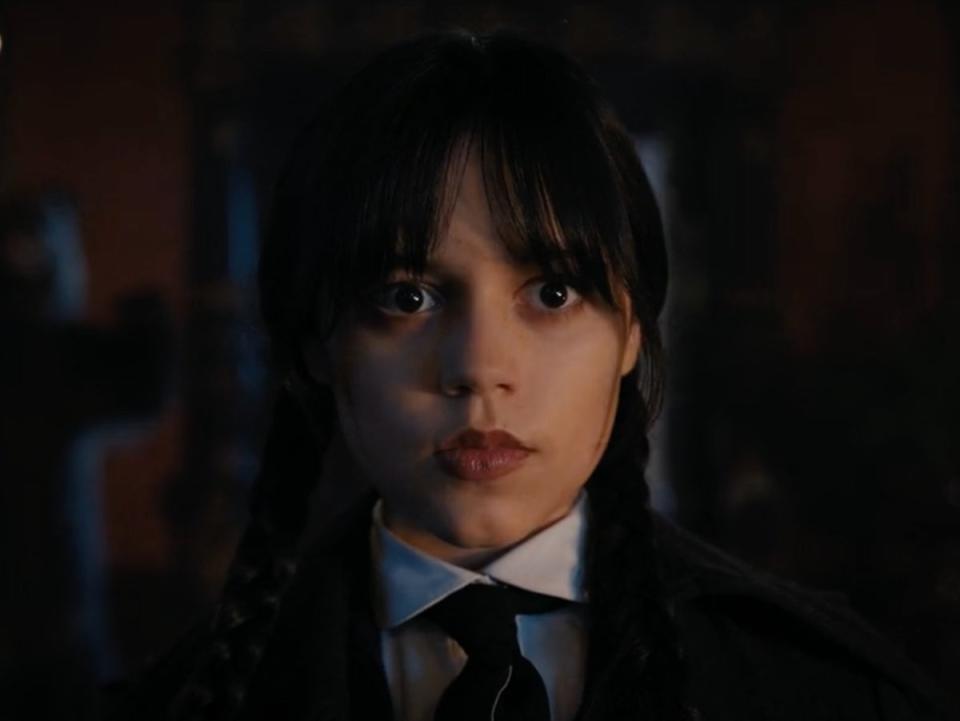Wednesday is a Netflix success story we could come to regret

Do you hear that? That distant popping sound? It’s the sound of Netflix bosses cracking open the champagne. Last month, it was announced that Wednesday, the streamer’s series based on the Addams Family character, had become quite the hit. According to data released by Netflix, it surpassed Stranger Things’s record as the platform’s most-watched title ever in a single week. These results claimed that the show had been streamed for a grand total of 341.2 million hours after just seven days. One week later, Wednesday broke its own record, and now has amassed streams of more than 400 million hours. Brilliant news for those involved with the show, but not so great for the future of the small screen.
Wednesday is perfectly serviceable television. It’s jauntily soundtracked (Danny Elfman), indelibly costumed (Colleen Atwood) and excellently cast (John Papsidera and Sophie Holland) – without its spellbinding lead star Jenna Ortega, Wednesday risked being as dull as a dreary Monday. But even with Ortega, it can’t escape certain trappings, namely the fact that it’s essentially Gen-Z Addams Family by way of Riverdale. For a show about an adored kooky sharpshooter, who has been the source of Halloween costumes everywhere since 1992, Wednesday lacks bite and, since its release, more than three people have described it to me as decent “background” television.
Suddenly those 400 million hours begin to make sense.
The middling quality of Wednesday is not what concerns me, though. I’m more worried about its success, and the consequence these numbers will have going forward. Wednesday’s popularity – the level of which is unprecedented – could have an adverse effect on the greenlighting process for new shows. In other words, original ideas could be moved to the bottom of the pile.
Shortly after those bottles of champers are corked – enjoy them; they’re well earned – there will be a meeting of minds about how to best emulate Wednesday’s ratings haul. The obvious conclusion will be to mine existing film franchises for characters with their own series potential. No idea will be a bad one, with anything and everything thrown at the wall: Inigio, a prequel charting the early days in the life of The Princess Bride’s fencing master Inigo Montoya, could be considered. Farbissina, a series exploring the rise of Dr Evil’s Austin Powers henchwoman, from Fraulein to Frau, will be floated. Perhaps Shrek’s Lord Farquaad will be considered for spin-off treatment, with eight episodes exploring how the diminutive baddie came to despise fairytale characters. (I don’t know why, but I’m thinking Tom Hollander for the role.)
Tim Burton is being attributed with a large chunk of Wednesday’s triumph, which is somewhat unfair considering he only directed four episodes. The minds behind the series are Smallville duo Alfred Gough and Miles Millar. But it certainly feels like Burton has found a new home after cutting ties with Disney in October. His back catalogue will undoubtedly be perused. If Lydia, a series catching up with Winona Ryders’ Lydia Deetz in the aftermath of Beetlejuice (I’d watch) is thrown out for being too Wednesday-lite, a series based on Edward Scissorhands won’t. Writers everywhere will frantically be working out an answer to the long-standing question: “How exactly does he go to the toilet?” Or perhaps Burton will team up with proven Netflix master Ryan Murphy for a Feud-style Ed Wood spin-off based on the life of Dracula actor Bela Lugosi. David Harbour should certainly expect a call.
Because of Wednesday, every character from anything with even a hint of a fandom will be placed under the spotlight, with viewership potential unscrupulously mined by the experts. This notion is even more disappointing considering the state of cinema right now. With practically every tentpole release being reserved for a sequel, prequel or spin-off, originality is getting increasingly quashed in favour or existing IP. Fortunately, television can provide a home for the untested, more left-field ideas, with writers able to use their episode count in imaginative ways to introduce new worlds, characters and situations.

But Netflix, which is prone to swinging the axe on ambitious projects when not enough people are watching, clearly operates on an “if it ain’t broke” method. This means Wednesday’s status as a huge hit will be an inadvertent nail in the coffin for originality. While it seems like a labour of love for those involved, the success of Wednesday is one that TV fans, not to mention jobbing writers with refreshing ideas, could be ruing for years.

 Yahoo News
Yahoo News 
